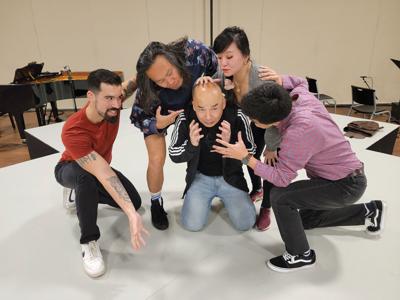In 2005, a Chinese food delivery person was trapped in an elevator in the Bronx for an incredible 81 hours — a harrowing ordeal complicated by the fact that he happened to be an undocumented immigrant. Not surprisingly, the incident made headlines, sparking plenty of outrage and debate about the plight of undocumented workers in this country. It also inspired a most unusual opera — Stuck Elevator, which takes the stage at Nashville’s Noah Liff Opera Center this weekend.
“Stuck Elevator is such an interesting piece, not only because of the story it tells, but also in terms of the music and design,” says John Hoomes, CEO and artistic director for Nashville Opera. “It’s really quite different from anything we’ve ever done. There are so many musical influences, including everything from rap and pop to classical and a sort of modern dissonance. But it’s also incredibly beautiful, with these big emotional moments that are quite tender and moving.”
Hoomes says the piece has evolved quite a lot since its world premiere at San Francisco’s American Conservatory Theater in 2013. For the past few months, composer Byron Au Yong and librettist Aaron Jafferis have been hard at work, rewriting and streamlining it even more.
“I really like what this piece is about,” Hoomes says. “It’s a bit of an emotional roller coaster, but so powerful. And there are surprising bits of humor too. But I especially like the way it puts a human face on everything. As we get to know [the main character] Guang, we come to understand his hopes and dreams and fears, the isolation and uncertainty he faces. We learn about the sacrifices he’s made to come to this country, the family he was forced to leave behind, and the horrible debt he faces after paying human smugglers $60,000 to bring him to the United States in a container ship. As the story unfolds, it becomes clear that Guang is not just trapped in this elevator, he’s also trapped by life.”
Of course, the longer Guang is stuck in the elevator, the more his mind jumps around, sifting through thoughts and memories in a very nonlinear way. Add in the inevitable fatigue, hunger and dehydration, and those memories soon take on a more surreal quality, exploding into full hallucinations.
“We have these colorful, fragmented scenes where he encounters all these other characters, such as his wife, his nephew, the man who smuggled him into the country,” Hoomes explains. “But at the end of each fantasy scene, he’s right back where he started in the elevator — stuck in every possible way. What’s so interesting, though, is that we’re right there with him. And while his situation doesn’t really change — even after he’s rescued — my hope is that by the end, the audience will have changed the way they look at Guang, because we’ve humanized him.”
For Julius Ahn, the award-winning tenor who originally created the role of Guang, it’s that element of humanity that makes Stuck Elevator so relatable.
“Stuck Elevator is often billed as a Chinese or Asian story,” says Ahn, who most recently visited Nashville in 2012, performing in Nashville Opera’s production of Madame Butterfly. “But it’s not about any one group. It’s looking at what a lot of immigrants go through on a daily basis, so it’s actually a very American story in that way. And while the show can go to extremes creatively, it’s rooted in that truth and humanity. I think that’s what allows so many people to connect with it. And that’s really my goal. I want audiences to live through this situation with him. Don’t sit back. Don’t try to hold the story at arm’s length. Take it in, and allow yourself to be swept away by the story and the music.”
Ahn says he’s delighted to be back in Music City, calling Hoomes “an amazing director.”
“I love working with John,” Ahn says. “He’s so knowledgeable, but there’s also an incredible openness there. There are no walls with John. And as a person of color, I find that to be so wonderful. He’s always looking for ways to keep the conversation going.”
With that in mind, Nashville Opera is partnering with the Tennessee Immigrant and Refugee Rights Coalition to host talkback sessions after each performance, looking at what it’s really like to be undocumented in America — and in Nashville.
“These discussions can be so helpful in terms of destigmatizing immigrant issues and stories,” Ahn says. “That’s one of the beautiful things about art — it can break down walls and expand our horizons.”





